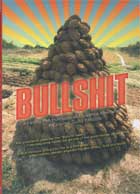
Bullshit 2005
Distributed by Cinema Guild, 115 West 30th Street, Suite 800, New York, NY 10001; 212-685-6242
Produced by PeÅ Holmquist and Suzanne Khardalian
Directed by PeÅ Holmquist
DVD, color, 74 min.
Sr. High - Adult
Agriculture, Women's Studies
Date Entered: 04/04/2007
Reviewed by Barb Bergman, Minnesota State University, MankatoThe film Bullshit follows environmental activist Vandana Shiva as she travels around the world to in her quest to eliminate the use of genetically modified foods and seeds in her home country of India and other developing countries. Shiva argues that the “ownership of life” through the patenting of natural products, namely grains altered through genetic modification (GMOs), is not in our best interests, and is in fact harmful to agriculture in developing countries.
The ag product company Monsanto has been frequently challenged because of its creation and marketing of genetically modified seeds to developing countries. Monsanto’s patented sterile seed require the application of fertilizers, herbicides, and other chemicals in order to produce a crop. (That this is the larger problem is not made clear in the film.) The film talks about farmers committing suicide, often through ingestion of the chemicals, because they have become hopelessly in debt from buying seed and chemicals. (That debt is the major issue is not clearly addressed either). In contrast, Shiva does discuss some naturally drought-resistant grains housed at the seed bank at the Navdanya farm.
Potential health risks from GMOs is mentioned in passing, but not directly addressed. A tour of the Monsanto research facility in the U.S. by the filmmaker fails in the apparent purpose of showing the company as having nefarious plans. The researcher interviewed simply shows their research methods such as how the corn genes are spliced, with no apparent awareness of the filmmaker’s views on GMOs.
Dr. Vandana Shiva is a fascinating activist with a passion used in support of responsible agricultural production in developing countries. Unfortunately, this film does a poor job of showing this work. Bullshit appears to take its name both from the “bullshit award for sustaining poverty” offered by her opponents who support further globalization and from the use of cow manure by rural women in India for fuel and building. However, this, like much of the film, this is not entirely clear. I would have enjoyed a more tightly edited film that was better focused on Dr. Shiva. Unfortunately, the film overall is much too long and disjointed to be effective in classroom use. Ideas are frequently introduced, but rarely fully explained. In spite of having some familiarity with the issues, I often found myself confused as to the purpose of seemingly random comments from Shiva and others.
The filmmaking often comes across as amateur. Sound level and quality varied greatly, therefore it was difficult to follow some of the conversations. Several sections would have benefited from the use of a tripod and external microphone. There were numerous unnecessary sections of footage that added nothing to the film except running time (Shiva answering cell phone; sleeping on a train, etc). Although some will nonetheless find this film useful, especially if looking specifically for information on Vandana Shiva, overall I cannot recommend this film. The poor organization and overall length detracts from the film’s message too much to justify the high purchase price.
Navdanya, the farm which is shown briefly in the film, is a biodiversity conservation program that keeps a seed bank of natural grains and provides education to local farmers. I found the Navdanya website to be more informative overall than the film.
For a better discussion of genetically modified organisms and the patenting of genes, see Not for Sale distributed by Bullfrog Films.